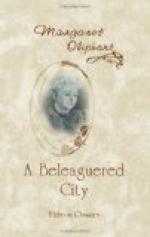below no influence was felt. They all gazed,
not able to get their breath, speechless, beside themselves
with joy, and saw the walls reappear, and the roofs
of the houses, and our glorious Cathedral against
the blue sky. They stood for a moment spell-bound.
M. de Bois-Sombre informs me that he was afraid of
a wild rush into the city, and himself hastened to
the front to lead and restrain it; when suddenly a
great cry rang through the air, and some one was seen
to fall across the high road, straight in front of
the Porte St. Lambert. M. de Bois-Sombre was at
once aware who it was, for he himself had watched
Lecamus taking his place at the feet of my wife, who
awaited my return there. This checked the people
in their first rush towards their homes; and when
it was seen that Madame Dupin had also sunk down fainting
on the ground after her more than human exertions
for the comfort of all, there was but one impulse of
tenderness and pity. When I reached the gate on
my return, I found my wife lying there in all the
pallor of death, and for a moment my heart stood still
with sudden terror. What mattered Semur to me,
if it had cost me my Agnes? or how could I think of
Lecamus or any other, while she lay between life and
death? I had her carried back to our own house.
She was the first to re-enter Semur; and after a time,
thanks be to God, she came back to herself. But
Paul Lecamus was a dead man. No need to carry
him in, to attempt unavailing cares. ’He
has gone, that one; he has marched with the others,’
said the old doctor, who had served in his day, and
sometimes would use the language of the camp.
He cast but one glance at him, and laid his hand upon
his heart in passing. ’Cover his face,’
was all he said.
It is possible that this check was good for the restraint
of the crowd. It moderated the rush with which
they returned to their homes. The sight of the
motionless figures stretched out by the side of the
way overawed them. Perhaps it may seem strange,
to any one who has known what had occurred, that the
state of the city should have given me great anxiety
the first night of our return. The withdrawal
of the oppression and awe which had been on the men,
the return of everything to its natural state, the
sight of their houses unchanged, so that the brain
turned round of these common people, who seldom reflect
upon anything, and they already began to ask themselves
was it all a delusion—added to the exhaustion
of their physical condition, and the natural desire
for ease and pleasure after the long strain upon all
their faculties—produced an excitement
which might have led to very disastrous consequences.
Fortunately I had foreseen this. I have always
been considered to possess great knowledge of human
nature, and this has been matured by recent events.
I sent off messengers instantly to bring home the women
and children, and called around me the men in whom
I could most trust. Though I need not say that
the excitement and suffering of the past three days




